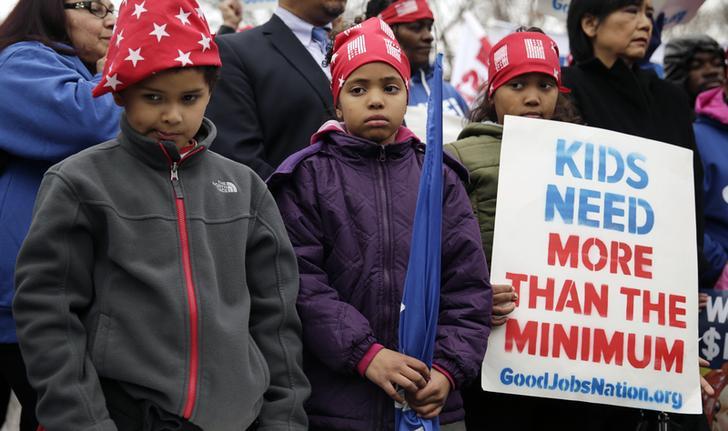President Trump, would you ever support a federal living wage?
Three young children of low-wage US federal contract workers attend a rally to raise the minimum wage to $15 per hour outside the Capitol in Washington, DC, on Nov. 13, 2014.
Over President Donald Trump's first 100 days, we're asking him questions that our audience wants answers to. Join the project by tweeting this question to @realDonaldTrump with the hashtag #100Days100Qs.
#80. @realDonaldTrump, would you ever support a federal living wage? #100Days100Qs
Donald J. Trump. John F. Kennedy. Herbert Hoover.
The United States has had 45 presidents. But Trump, Kennedy and Hoover are the only three who were so independently wealthy that they felt inclined to forego the salary that comes along with being the country’s chief executive.
President Trump still has not released his tax returns, so we don’t exactly know what his income looks like — though Forbes estimates that his net worth is in the neighborhood of $3.5 billion.
The precise number doesn’t much matter. You’ve got to have a lot of money to turn down the $400,000 in wages that presidents are paid each year for their service.
What does $400,000 look like, anyway?
Broken down to an hourly wage over the course of a standard 40-hour workweek, Trump's salary would be about $192 per hour, if he wasn't donating it to the National Park Service.
That figure is a far cry from the $27 per hour that adds up to the country’s median household income of $55,775, according to data released in 2016 from the United States Census Bureau.
And for those who earn the national minimum wage of $7.25? It would take nearly 27 hours — more than an entire day at work — to earn what the president makes in just 60 minutes.
The spectacle of a president who is so wealthy that he could turn down such a high salary and get by without a struggle raises the question: Should American workers be making more money?
It’s a question that’s been gaining momentum.
Just a few weeks after Trump’s election, thousands of low-wage American workers took to the streets in over 300 cities to demand that the federal minimum wage be raised to $15. Those demonstrations were part of the “Fight for $15” movement, a national campaign that began in 2012 when more than 100 fast-food workers went on strike in New York City to demand unionization and higher pay.
Their efforts have seen some success. Thirty states now have hourly income thresholds beyond the federal minimum wage, which has sat at $7.25 since 2009.
But even as states are raising their minimum wages, groups like Fight for $15 are raising awareness that in many parts of the country, a minimum wage simply doesn’t offer enough money to pay the bills. Instead, government officials ought to ditch the idea of a minimum wage altogether and start talking about establishing a living wage. Advocates say the country needs a living wage that makes sure all Americans earn enough money to cover all of their basic needs — including food, housing, childcare, education, transportation and the cost of dealing with sudden emergencies.
The difference between earning minimum wage and a living wage is a make-or-break distinction for low-wage earners, who make up a substantial portion of the US workforce.
The Bureau of Labor Statistics estimates that in 2015, 2.6 million workers in the US — amounting to approximately 3.3 percent of all the country’s hourly employees — earned as much as or less than the minimum wage. Meanwhile, the National Employment Law Project reports that 42 percent of Americans make less than $15 per hour. Those numbers are worse for women, African Americans and Latino workers.
Amy Glasmeier, a professor at the Massachusetts Institute of Technology, created a Living Wage Calculator to help determine just how much people need to get by in different parts of the country.
Mr. President, you’ve had a lot to say about the minimum wage. In fact, you’ve sent so many mixed signals about it that The Washington Post wrote an article devoted to fact-checking your statements about whether or not you want to raise, lower or maintain the minimum wage.
You’ve been silent, however, about whether or not you would ever consider passing a living wage for America’s workers. Would you think it over, and let us know?
To tweet this question to the president, click here.
